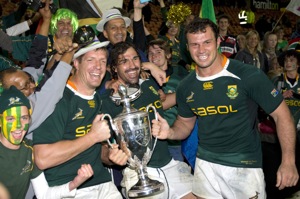
South Africa's Bakkies Botha, left, Victor Matfield and Bismarck du Plessis celebrate winning the Tri Nations Cup after defeating New Zealand in the Tri Nations International rugby match, Waikato Stadium, Hamilton, New Zealand, Saturday, Sept. 12, 2009. (AP Photo/NZPA, David Rowland)
This is the first of a series of three articles where I’ll attempt to objectively review each team’s performance from this year’s Tri-Nations and assess their prospects for the upcoming spring tours. First up is this year’s champions – South Africa.
A third Tri-Nations championship to the Springboks has capped off a marvellous year of achievement for South African rugby this year.
Coach Peter de Villiers and his assistants Dick Muir and Gary Gold changed their freestyle approach from last year and developed a more structured, playing strategy based upon pressure, pressure, pressure. A quote from NZ rugby columnist Marc Hinton succinctly sums up their season, “The reality is the Boks don’t beat you with their brilliance. They beat you with their resilience”.
By applying and sustaining pressure they strangled the life out of their opposition like a giant anaconda. They were dominant at the lineout, and used intelligent, accurate kicking, strong defence and relentless chasing. However it was the introduction of two newcomers to the side that had a dramatic effect on the Springboks fortunes in this year’s Tri Nations.
The enforced selection of impressive newcomer Heinrich Brussow, through injury to Schalk Burger, proved to be an inspired and inspirational choice.
Brussow’s work at the breakdown as a traditional fetcher, provided the Springboks with an edge they had previously conceded to their rivals Australia and New Zealand.
The Boks have never lacked for size in their forwards and Brussow’s speed and strength over the ball enabled them to take advantage of their size at the breakdown where even opponents as highly regarded as Richie McCaw and George Smith played second fiddle to the man from Free State.
When Morne Steyn replaced an injured Ruan Pienaar in the second half against the All Blacks at Bloemfontein, he looked composed, comfortable and totally in charge.
Not since another famous Northern Transvaal son has there been a Springbok flyhalf who could tease, dominate and destroy opposing teams with his boot.
Together with his namesake Francois Steyn they proved to be a lethal one-two knock out punch to any team that transgressed within sixty metres of their goalposts.
Their goal kicking display in their final Tri Nations match in Hamilton was of the highest quality and conveniently at an appropriate venue, the home of former All Black legend “The Boot” Don Clarke, who is now a South African resident.
The pressure the Springboks brought to bear forced Australia and NZ to either kick possession away to get into the Springbok half, or try to play the game from deep within their own half, without a great deal of success.
Despite the negative criticism their style of rugby attracted from Australian and New Zealand media and fans, they were the only team to score a four try bonus point win this season, and were only outscored by tries in their loss to Australia.
Their breakout performance this year was the win at Hamilton to complete a 3-0 clean sweep against NZ.
It was a clinical, controlling performance, all the more impressive being their third match on the road and following an unexpected loss to Australia.
While the All Blacks launched a late rally to close within three points, there were no arguments about the final and deserved victors of the match and the championship.
A large part of the Springboks success was a lack of serious injury; they were a largely settled squad and were able to establish combinations particularly in key positions.
Will their Tr-Nations success automatically translate to a successful, unbeaten spring tour for the Springboks?
They’ll certainly be buoyant, optimistic and confident. It will be interesting to see if the Boks retain their successful tactics or continue to develop their game and broaden their attacking scope.
Italy, France and Ireland generally possess bigger forwards than NZ and Australia, so will pose a different challenge for South Africa.
France impressed on their June tour, outplaying NZ and Australia at the breakdown and was extremely competitive at the setpieces.
They loom as the strongest challenge to South Africa.
Italy are strong scrummagers and will look to test the Springboks front row but don’t possess the strike runners to threaten South Africa’s defence and you won’t beat this team on penalty kicks alone.
It remains to be seen if the style of play adopted by the Lions this year will be taken on by all home unions, however for the likes of Ireland who featured some player’s central to the attacking spark for the Lions they are well placed to seriously challenge if not upset the Springboks on tour.
They will have all taken note of the relative experiences and successes the Lions and Antipodean teams have had against South Africa and where the Springboks showed their vulnerability.
However, I would be surprised if the Springboks don’t record a clean sheet.
It should make for a fascinating tour.





























































































